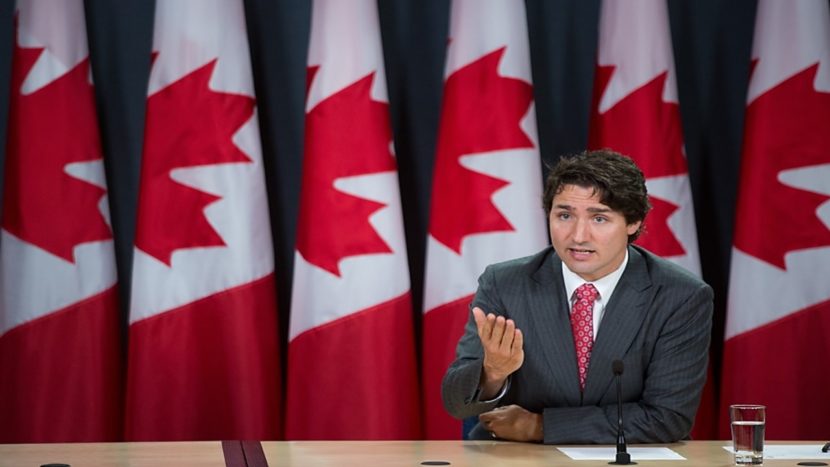Trudeau condemns misinformation about UN migration pact
Canada's Prime Minister says 'fearmongering' and 'falsehoods' have no place in country's political discourse on immigration
Canadian Prime Minister Justin Trudeau has condemned what he says is “misinformation” about his government’s decision to support a new United Nations agreement on migration.
The agreement, known as the United Nations Global Compact on Safe, Orderly and Regular Migration, sets out 23 objectives for improved international cooperation on all forms of migration, from refugees and asylum seekers to the movement of skilled workers throughout the world.
The agreement is not legally binding, meaning it does not impose rules on participating countries.
Trudeau was responding to comments made by Conservative Party of Canada leader Andrew Scheer, who said the agreement threatened to surrender Canada’s sovereignty over immigration policy to “foreign entities” and undermine free speech.
Scheer’s concerns were widely denounced as unfounded, with many critics pointing to the pact’s affirmation of “the sovereign right of States to determine their national migration policy and their prerogative to govern migration within their jurisdiction, in conformity with international law.”
Trudeau told the Canadian Press this week that the Conservatives were playing politics with immigration, which he condemned as “irresponsible” and even “dangerous.”
Canada’s next federal election is scheduled for October 2019 and the Conservatives are hoping to regain power after losing to Trudeau’s Liberal Party in 2015.
“To deliberately and knowingly spreading falsehoods to Canadians for short-term political gain and to drum up anxiety around immigration is irresponsible and is not the way we should be moving forward in a thoughtful way on one of the big issues that are facing our country,” Trudeau said.
A threat to free speech?
Scheer’s comment about free speech referred to the compact’s objective to “eliminate all forms of discrimination and promote evidence-based public discourse to shape perceptions of migration.”
Among the actions listed under this objective is a call for “sensitizing and educating media professionals on migration-related issues and terminology” and “stopping allocation of public funding or material support to media outlets that systematically promote intolerance, xenophobia, racism and other forms of discrimination toward migrants, in full respect for freedom of the media.”
Scheer said this objective was an “attempt to influence how our free and independent media report on immigration issues,” a point The Canadian Press determined to be “mostly inaccurate.”
Trudeau said immigration policy should be debated, but “fearmongering and misinformation” have no place in Canada’s political discourse on the issue.
“[It] is very dangerous to something that has been an extraordinary advantage and benefit for Canada for generations,” he said.
‘No impact on our sovereignty’ and ‘no right to migrate’
Scheer also faced criticism from former Conservative immigration minister, Chris Alexander, who wrote on Twitter that Scheer’s statement on the global compact was “not factually correct.”
“The compact is a political declaration, not a legally binding treaty. It has no impact on our sovereignty,” Alexander said.
“Canada has always been a champion and example of safe, orderly and regular migration.”
Former Supreme Court of Canada Justice Louise Arbour, who serves as the UN’s Special Representative on International Migration, has also spoken out about misleading information that is circulating about the pact and its potential implications, saying “it creates no right to migrate. It places no imposition on states… It is not legally binding.”
On Twitter, Arbour described the compact was “an effort to do better together, to look at the decades ahead of us, and collaborate on the wide range of issues pertaining to international migration.”
Canada was one of 164 countries that adopted the global compact last week in Marrakech, Morocco.

